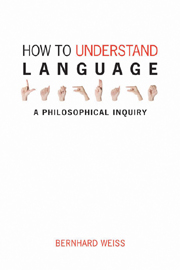Book contents
- Frontmatter
- Contents
- Preface
- 1 The puzzles of language
- 2 The starting-point for analysis
- 3 Analysing sentence-meaning
- 4 Analysing synonymy
- 5 Radical translation
- 6 The structure of a theory of meaning
- 7 Radical interpretation
- 8 Linguistic norms, communication and radical interpretation
- 9 Linguistic normativity
- 10 Radical or robust?
- 11 Language and community
- 12 Rules and privacy: the problem
- 13 Rules and privacy: the solution?
- 14 Truth-conditions versus use-conditions
- Notes
- Bibliography
- Index
9 - Linguistic normativity
- Frontmatter
- Contents
- Preface
- 1 The puzzles of language
- 2 The starting-point for analysis
- 3 Analysing sentence-meaning
- 4 Analysing synonymy
- 5 Radical translation
- 6 The structure of a theory of meaning
- 7 Radical interpretation
- 8 Linguistic norms, communication and radical interpretation
- 9 Linguistic normativity
- 10 Radical or robust?
- 11 Language and community
- 12 Rules and privacy: the problem
- 13 Rules and privacy: the solution?
- 14 Truth-conditions versus use-conditions
- Notes
- Bibliography
- Index
Summary
Norms and prescriptions
Linguistic items are meaningful and most of our uses of them are meaningful too. In order for this to be the case, language is bound by a set of correctness-conditions according to which uses of language can be categorized as either correct or incorrect – that is, there are linguistic rules – or so it is at least plausible to suppose. Our question now is not whether or not language is meaningful and normative in this sense but whether those correctness-conditions normatively bind speakers' use of language: does this normativity of language entail the normativity of linguistic usage? Ought speakers of a language to abide by its correctness-conditions? Do linguistic rules entail linguistic norms, or, more pithily, do linguistic rules rule? I shall argue that provided we focus on the appropriate correctness-conditions – correctness-conditions framed at the level of sense rather than that of reference – these do indeed deliver oughts governing use.
The question before us is not whether this or that conception of meaning is committed to the normativity of language use, but whether any account of meaning should be so committed; or rather, whether any account that links meaning with correctness-conditions is so committed. We shall also make very few assumptions about how correctness-conditions are to be conceived; these may simply be application conditions of a predicate or denotation conditions for a name. Thus, in effect, we shall be asking whether any theory of meaning should be committed to the normativity of language use.
- Type
- Chapter
- Information
- How to Understand LanguageA Philosophical Inquiry, pp. 143 - 154Publisher: Acumen PublishingPrint publication year: 2009



